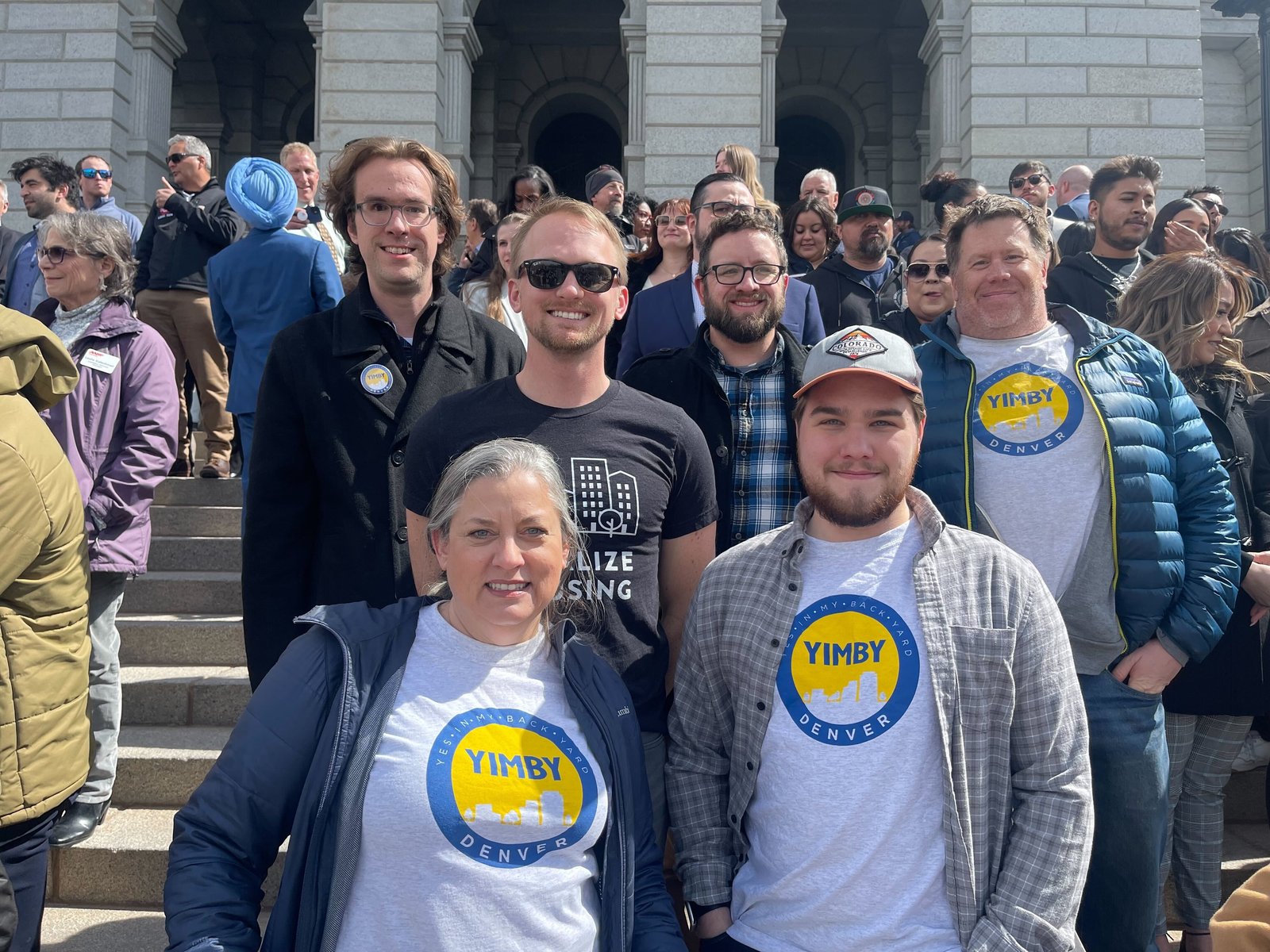
Guest Blog by Scott Lucas
On August 11, the Denver City Council voted 9-3 to eliminate parking minimums in the city. Now, new construction will not be required to have any particular number of parking spaces. Instead, each developer is free to have as many spots — or as few — as they see fit.
“It's rare that we celebrate taking things out of the planning system,” said Luchia Brown, the former Communications Chair of YIMBY Denver. “But this is a good example of that.”
From Shoup to the Statehouse: The Long Road to Reform
Although it may be a good example, it took a long time to gestate. In 2005, UCLA professor of urban planning Donald Shoup published his book, "The High Cost of Free Parking," in which he argued that regulations requiring parking had caused untold damage to American cities by keeping people dependent on their cars and burning gasoline instead of walking or using public transit. Shoup’s ideas were influential, but influence does not always mean action.
For that, it took the Colorado legislature. In its 2023 session, the legislature considered a 105-page bill that would have broadly reformed the state’s land use law. It was ambitious — too ambitious, in fact, and it failed to pass. “I told people it was like YIMBY Christmas,” said Kevin Matthews, the Policy Committee Chair of YIMBY Denver. “But being that it was the first time that this sort of thing ever got introduced, it got torn apart and whittled down and then failed on the last day of the session.”
In the following session, legislators divided these ideas into separate bills, with the hope of passing some of them into law. “They did a transit-oriented communities bill, an ADU bill, a planning bill, and a parking bill,” said Matthews.
Colorado’s Breakthrough Moment

The bill restricting parking minimums ended up in the hands of State Representative Stephanie Vigil, who was elected in 2022 to the Colorado Springs City Council. “There’s no such thing as free parking,” Vigil told CPR News in May, echoing Shoup. “It is being paid for somehow. And the way that we have paid for that more than anything is to pave paradise and put up a parking lot.”
Vigil’s bill did not simply ban parking minimums statewide. It took a more measured approach, applying only to multi-family residential and adaptive reuse projects within a quarter mile of qualifying transit stops. “Initially, her whole approach was to eliminate parking across the state,” said Matthews. “And of course, as it goes through the legislative process, things get whittled down. Especially in the State Senate, a lot of compromises had to be made.” The resulting bill was limited to projects in metropolitan areas near public transit. Even still, it was a close vote. “People who own cars and expect to be able to park them where they live are not bad people,” complained one legislator.
But in April, the Colorado House of Representatives passed the bill by a 35-26 vote. The following month, the state senate passed it by a 19-15 vote, after which Governor Jared Polis signed it into law. “This legislation will eliminate excessive parking requirements that unnecessarily increase housing costs for renters and buyers,” Polis said when he signed the bill. “People should be able to choose how much parking they want and not be forced to pay for parking they don’t want.”
From Law to Local Action
As is often the case, passing a bill is one thing, but implementing it is another. Tasked with implementing the bill’s requirements, the Denver City Council soon recognized it had a problem — determining which city parcels the bill covered would be a cumbersome process. Worse, once the planning department figured that out, it would lead to the strange circumstances in which one plot of land might be covered by the bill, while the one next door would not. Denver’s Planning Department worried it would have to hire new staff members just to handle the GIS work alone. “Our city staff spend more than 650 hours every year working on very complicated parking rules and regulations,” Chris Hinds, a member of the city council and one of the sponsors of a city ordinance, told his local PBS station. All of this hand-wringing begged the question: wouldn’t it be easier if the city did away with parking minimums entirely? It seemed like a good idea, but even the best ideas are not self-executing. “We have a really big problem with permitting times right now,” said Matthews. “The mayor has been trying to resolve that, but we have builders waiting two years to get a permit.”
It helped that YIMBYs had already built political capital with the city’s mayor.
“In my view, our endorsement and on-the-ground support of Mayor Mike Johnston's 2023 election campaign were instrumental in two key aspects,” said Ryan Keeny, YIMBY Denver President. “One, we were able to secure his support for a slate of bills in the 2024 state legislative session, including HB24-1304. We explicitly made this ask to his staff, and after some back and forth, they confirmed the mayor's support of the legislation. Two, after the bill passed, Denver's Department of Community Planning and Development, ultimately accountable to Mayor Johnston, launched the Modernizing Parking Requirements project to comply with the new state law. That proposal then headed to council, where we leveraged our relationships there to secure passage.”
But translating that relationship into parking reform was not automatic. It took work.

Brewing Support: Organizing on the Ground
Enter Cerebral Brewing. During the pandemic, the brewery had turned its small parking lot into a covered patio. However, after the city program that allowed the conversion expired, the company was required to convert the patio back into parking spaces. The owners were mad enough to do something about it, so when the parking reform coalition had its kick-off meeting to organize support for the city ordinance, they did it in Cerebral’s parking lot. “They talked about how they’d lost space for business and why it didn’t make sense for them to be forced to provide parking at a place that serves alcohol,” said Matthews. The brewery was one of many similar businesses in Denver that had been able to reuse their parking lots during the pandemic, building a sense across the city of the possibilities that reformed parking rules could bring.
Or to put it another way, people love what they can do without mandatory parking lots. “We had a big love-in there in February,” said Brown. “We had a happy hour and had people write postcards to their city council members that were like Valentine’s. Please be mine. And get rid of parking minimums. We gave them the cards, the pen, the stamp, and the address of their council member.”
Strength in Numbers
YIMBY Denver organized alongside a broad coalition of groups, including the Denver Streets Partnership, the Southwest Energy Efficiency Project, the National Resources Defense Council, Conservation Colorado, and the local chapter of Strong Towns, as well as affordable-housing developers and bike advocates. Soon, activists realized that the ordinance was gaining considerable support on the council. Four members signed up to sponsor it — a large number considering it needed seven votes to pass. Matthews believed the state reform provided political cover to members of the city council who might have otherwise wavered. When they faced criticism, they could point to the state law as the reason they had to act.
Springing into action of its own, YIMBY Denver organized its members in support of the ordinance, encouraging people to attend in-person meetings and to contact their council members. And turning out YIMBY supporters worked— Matthews estimated that three out of every four letters or emails that the council received were in support of parking reform, including those valentines. The goal was to demonstrate that parking reform was popular and that council members who voted for it would be representing the wishes of their constituents.
He attributed the campaign’s success to groups like YIMBY Denver, which had laid the groundwork in 2018 and 2019 by organizing a campaign to remove residential occupancy limits from the Denver zoning code under the rubric of legalizing group living. It wasn’t quite the same issue, but Matthews remembered that it brought out NIMBYs to complain that if it passed, their parking would be affected. “They were freaking out,” he said. “But they were drowned out.”
It wasn’t just the group housing campaign that paved the way — the work building support for SB 213 helped. However, what also seemed to have tipped the balance was the pandemic, during which many Californians relocated to Colorado. That increase in demand pushed housing prices up, but it also brought to the forefront a desire among many in Colorado to avoid repeating the mistake of the Golden State. “I don't think it was the intent of the state bill, but it seems the effect of it was that the path of least resistance for the city was to just go ahead and do the whole thing,” said Brown.
Ultimately, that work paid off. In August, the council voted to eliminate parking minimums throughout the city of Denver. Challenges still remain. Six Colorado cities filed suit in May, asking a judge to rule that they were not required to follow the parking minimum law and other recent housing reforms. And convincing banks to finance projects without the usual amount of parking has proven difficult so far. “Bankers are very conservative,” said Brown. Many of them aren’t sure they want to back projects without a lot of parking to go with them because they aren’t sure about the financials. Nevertheless, talk is spreading across the city about new projects that will capitalize on parking reforms.

Lessons for YIMBYs Everywhere
What can YIMBYs in other cities learn from the success in Denver? One lesson is that these kinds of victories take a long time. Several reform efforts in Colorado failed before this one crossed the finish line. Another is to build partnerships with other groups. YIMBYs in Denver worked closely with environmentalists, affordable housing advocates, and urbanist groups to pass parking reform. And don’t forget to make organizing fun! Why not hold an event at a brewery? And while you’re there, why not send Valentine’s Day cards to elected officials?
The final lesson is that even when YIMBYs win, those victories sometimes come with setbacks of their own. In December, Vigil lost her bid for reelection by just three votes out of more than forty thousand cast. But her story is not over. Still, at the YIMBYtown 2025 conference in September, the Parking Reform Network honored her with the Donald Shoup Award, acknowledging her work and looking to the road ahead.
